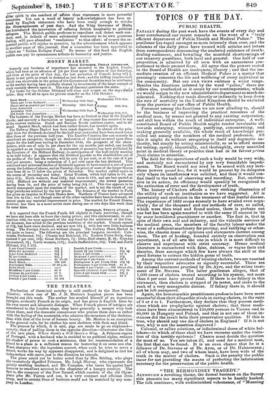TOPICS OF THE DAY.
PUBLIC HEALTH.
FATALLY' during the past week have the events of every day and hour corroborated our recent remarks on the want of a truly efficient department of Public Health and Medical Police." The pestilence has raged amongst us more intensely than ever, and the columns of the daily press have teemed with articles and letters from correspondents denouncing the unabated existence of death- dealing nuisances • and bewailing the manifold shortcomings of our sanatory guardians, both local and general. One half of our proposition is admitted. by all men with an earnestness pro- portioned to their present fears. All agree that the powers vested in the Board of Health are inadequate illusory ; and that the im- mediate creation of an efficient Medical Police is a. matter that pressingly concerns the life and wellbeing of every individual in the community. But our own views embrace a wider range. Besides the functions inferred by the werd "police," there are others also, overlooked as it seems by ourvontemporarits, which we would assign to the new administrativedepartment so much de- siderated. Nothing that tends directly or indirectly to keep down the rate of mortality in the United Kingdom should be excluded from the purview of our office of Public Health.
Foremost among the functions we are now alluding to, should be the business of improving the practical resources of the medical man, by means not granted to any existing corporation, and still less within the reach of individual enterprise. A well- constituted Board of Public Health might render invaluable aid towards enlarging, winnowing, purifying, concentrating, and making generally available, the whole stock of knowledge par- celled out among the members of the medical profession. All this it might do without arrogating to itself any dogmatic au- thority, but simply by acting ministerially, so as to afford means for testing, openly, impartially, and thoroughly, every unsettled point in medical theory or practice that had in its favour prima facie claims to attention. The field for the operations of such a body would be very wide, and certainly not encumbered by any very formidable impedi- ments. The Board would not need to be armed with any invi- dious powers poad hoe, for it would be present by its delegates only where its interference was solicited, Ind then it would con- fine itself to the task of observing and recording. But, unobtru- sive in its action, its efficiency would speedily be recognized in the extinction of error and the development of truth. The history of Cholera affords a very striking illustration of the utility of such an institution as we have suggested. All is uncertainty and confusion in the treatment of that fearful disease. The experience of 1832 seems scarcely to have availed even nega- tively; for of the thousand and one methods of cure, so called, which were then tried and found useless, there is perhaps not one but has been again resorted to with the same ill success in '49 by some bewildered practitioner or another. The fact is, that in spite of their own zeal and industry, and the valuable services of the medical press, the members of the faculty labour under the want of a sufficient machinery for proving, and ratifying or other- wise, the chaotic mass of opinions and statements current among them. The art of healing, founded entirely on observation and experiment, is of all arts the one in which it is most difficult to observe and experiment with strict accuracy. Hence medical literature is encumbered with false, dubious, or vague facts and theories, from amongst which few have always the skill or the good fortune to extract the hidden germ of truth.
Among the current methods of treating cholera, two are vaunted by their respective advocates as signally successful. These are the calomel treatment practised by Dr. Ayre, and the saline treat- ment of Dr. Stevens. The latter gentleman alleges, that of 1,000 cases of cholera treated according to his system, not more than 6 per cent have proved fatal. If there is no fallacy in this statement, then cholera is stripped of its terror, and sinks to the rank of a very manageable disease. If fallacy there is, it should not be left unexposed.
Again, the homeopathic practitioners profess to have been more successful than their allopathic rivals in curing cholera, in the ratio of 3 or 4 to 1. Furthermore, they declare that they possess medi- cines which are prophylactic against cholera; that these medi- cines have been administered to 150,000 persons in Vienna and to 80,000 in Hungary and Poland, and that in not one of those in- stances did the result belie their preservative qualities. If this is true, why should any one die of cholera in England ? If it is not true, why is not the assertion disproved?
Calomel, or saline solutions or infinitesimal doses of white hel- lebore—to which of these shall we have recourse under the visita- tion of this terrible epidemic? Chance must decide the question for most of us. You are taken ill, and send for a medical man, the first that can be found. It is an even chance that he is a follower of Dr. Stevens or of Dr. Ayre, or of Dr. Hahnemann ; all of whom may, and two of whom must, have been wide of the truth in the matter of cholera. Such is the penalty the public incur for not providing the means of perfecting the Information necessary for the preservation of the public health.


























 Previous page
Previous page